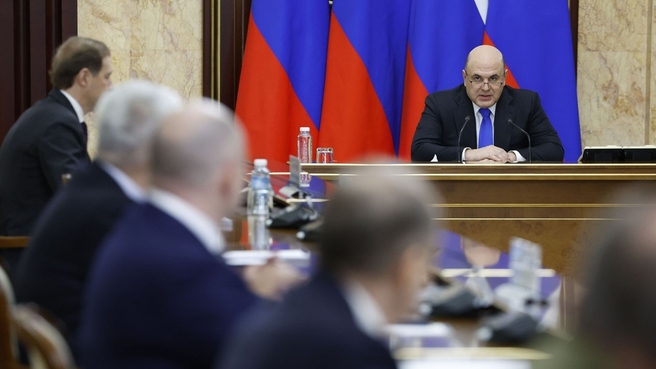Mikhail Mishustin’s opening remarks:
Good afternoon, colleagues.
In the two months since the Coordination Council was established by presidential executive order, much has been done to increase the productivity of industrial companies in the interests of the special military operation (SMO). They have increased production of a broad range of items.
This was achieved through the prompt identification and removal of many technical obstacles in production processes – at both defence industry companies and at their suppliers, in fulfilling orders for units in the SMO.
Shipments of arms, combat and special equipment have been adjusted, as have deliveries of personal body armour and all-season packs of personal belongings. These were the first results. Of course, this effort needs to continue with the same high-priority approach. Much still has to be done. Our industry is gradually coping with the current challenges and adjusting the situation. The working group headed by Denis Manturov, is in charge of this important area.
Over the past two months the Government has adopted a number of regulations on introducing special economic measures. They are aimed at ensuring the continuity of supplies and upgrading the quality of an entire range of items. The lead contractors in the state defence order were able to use our entire production and technical potential due to the partial or complete reactivation of mobilisation capacity and facilities.
The regions have received the right to purchase deal-purpose goods with their budgets and transfer them to the Armed Forces. The list of these goods is impressive – drones, night vision devices, sights, optical, laser and other targeting systems, as well as hiking equipment, medications, building materials and many other things. Federal and municipal departments and companies can buy products from a single producer for repairs, construction or installation, and also for providing logistics and uninterrupted deliveries for these purposes in the interests of the military.
The council has resolved many objectives in infrastructure, the building of fortifications and for engineering equipment. The necessary funding for these purposes has been allocated, including almost 34 billion roubles for subsidies to the regions bordering on Ukraine.
According to the reports, the tactical and technical tasks have been mapped out and sent to the executors. We have determined the responsible inspectors at this stage of putting facilities into operation. The working group headed by Marat Khusnullin is in charge of this area.
Monitoring the use of the budgetary funds allocated for the special military operation is an issue of major importance. The Government plans to audit the resources that were intended for the repair and production of weapons, and military and special equipment, as well as for the purchase of fuels and lubricants.
Over time, we will audit other spending categories related to the special military operation.
Separately, I would like to note the importance of resolving the social issues of service personnel and their families. This issue tops the list of priorities overseen by the Tatyana Golikova-led group.
Serious amounts have been set aside to fund additional assistance to mobilised citizens in the form of a lump sum payments and monthly payments to the service personnel participating in the special military operation.
Education is another area that we are supporting. Last week, the State Duma adopted, in the third reading, a law under which we will be able to allocate a special university admission quota for SMO participants and their children. Heroes of Russia and recipients of three Orders of Courage, as well as children of those who were wounded, crippled or shell-shocked in the combat zone will be eligible to use it.
Colleagues,
The President recommended that the public authorities in the Moscow Region, the Republic of Crimea and in Sevastopol adopt legislative acts to provide for free land plots to service personnel with a distinguished military service record during the special military operation and their families. The respective governments of the above regions should team up with the related federal executive bodies and provide a specific solution to this issue.
Today, I would like the working group leaders to report on providing for the needs of the Armed Forces in the respective key areas assigned to them, and the heads of the defence, law enforcement and security agencies to update us on the current situation.
Colleagues, before we move on to the discussion, I would like to remind you that today our country is marking Rescue Workers Day. Taking this opportunity, I would like to offer my congratulations to the Minister of Civil Defence, Emergencies and Natural Disaster Relief Alexander Kurenkov who is here with us and, in his person, the ministerial staff, rescuers and everyone who works with your department in one way or another. Many of you, in fact, do this work at your workplace, even without being on the ministry’s payroll.
Of course, I would like to congratulate Sergei Shoigu, who was head of the service for many years, on this professional holiday.
Regarding this agency, the ministry’s employees are the first to respond in emergencies, to save lives often at the risk of their own lives; they are examples of valor, courage and bravery. I would like to wish everyone working in this line if business, their families and friends good health and all the best. Happy Rescue Workers Day!









